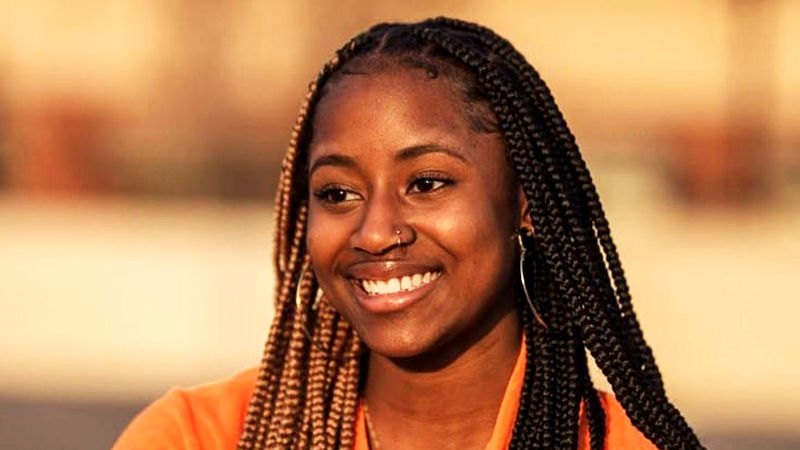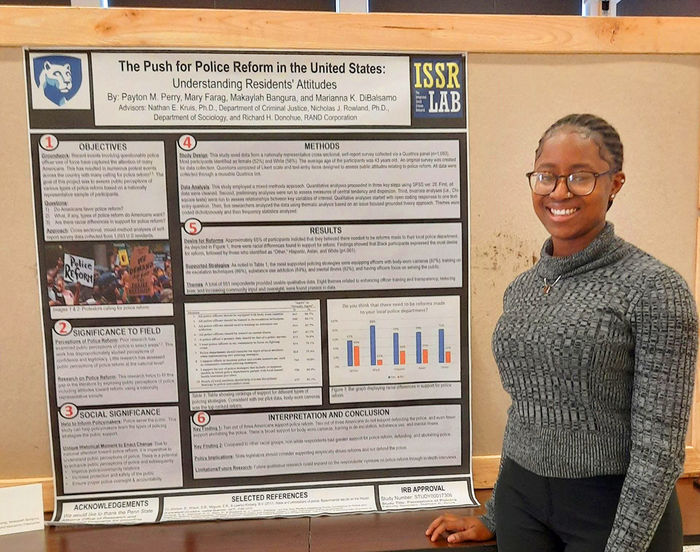

This dialog contains the full navigation menu for this site.

Penn State Altoona students may have questions about joining the college’s Integrated Social Science Research Lab (ISSRL), run by Nicholas Rowland, professor of sociology, and Nathan Kruis, assistant professor of criminal justice. “What would I be doing?” “Would it be interesting?” “Would I be able to fit it in with my other studies?” Penn State Altoona's Research and Teaching asked a veteran member of the research lab to talk about her experiences and why she is in the lab.
Sophomore nursing major Makaylah Bangura took Rowland’s introductory sociology course (SOC 001) in her first semester. “He kept sneaking in, ‘I co-run a research lab,’ and said we could come and ask him about it. He was very casual.” Bangura took him up on it and “sat in on some meetings” that fall. “It was more sitting in the lab, seeing what projects they were working on, seeing if I was interested in it, and shadowing people.”
What Bangura saw was enough to convince her to join the lab in the spring semester. “I joined the lab for one credit [two- and three-credit options are also available]. It was minimal work starting out, no ‘guns blazing.’” Penn State Altoona senior Payton Perry (now alumna) was “working on a study about the public’s perception on police reform. I was nervous, I didn’t know what to expect. Payton was very welcoming.”
Bangura started by joining a small group coding open-ended responses in a survey run state-wide in Pennsylvania. In that survey, participants “were prompted, ‘Do you favor police reform?’” Bangura explains. “If they said they were, they were asked, ‘what kind would you like to see in your community?’” Once the surveys were collected, students in the lab did open coding, which meant taking people’s responses to the open-ended survey questions and organizing them into themes. In this case, after analyzing the data, the student group came up with the following themes: “training, reduction of force, reduced discretion (holding officers accountable), reallocation of funds, mental health, community, prejudice.”

Makaylah Bangura and poster at the fall Student Expo
The survey was done first in Pennsylvania, which is when Bangura started open coding with one other student. Then they expanded the survey to the United States. “We asked the same questions of the US as we had in PA,” Bangura says. There was one change: “We did add an ‘I don’t know’ column because it just didn’t seem right (as we were open coding) that respondents who previously answered ‘yes’ to favoring police reform were excluded from analyses because they were not knowledgeable or educated enough on what types of reform they’d like to or could see within their local communities. So, after further discussion, this new—and previously disregarded—theme was included, further giving those participants a voice.”
For open coding the US responses, five researchers were needed. Even with that many people, “it wasn’t like the same minds, the same redundancies. After we five open coded, we decided which ones were usable and which one weren’t, like spot responses, for example, ‘yes,’ ‘no,’ ‘because I like it.’ We winnowed it down to 551 usable responses. Then we drew conclusions.” Bangura found the process “pretty simple.” She was also surprised that “even in open coding, we found that the US responses matched the PA responses, which allowed us to open code for the same themes. It was very cool to see.”
She says people often ask how she feels about working on research for subjects unrelated to her nursing major. Her all-encompassing answer to that question is, at first, “it can feel scary, aimless, and confusing. Scary in the sense that I am working on a project that I have very little to no knowledge on. Aimless because you would think I’d join a research lab to work on projects that relate to my major to get a leg up for graduate school or resume building. When this does not happen, it can feel like a waste of time at first ... and then you really begin learning. Finally, confusing and even frustrating in the sense that a lot of the information is new and intricate. So, it may be hard to grasp a topic at first, seeing how you would have never indulged if not for this lab.”
In the end, though, Bangura learned the benefits of researching outside one’s major. “Doing this unrelated research expanded my knowledge on certain topics that not only focused on the ‘significance of the field’ but also on how the project related to the public/society as a whole, which allowed me to broaden my gaze on the work and research I was conducting. Plus, it is always good to dip outside of your comfort zone or else growth stops.”
Overall, Bangura found working in the lab to be both “a lot of work” and “interesting. I enjoyed it.” And there is no wasted time: “They work really well managing time. We had a set time to meet, and this was what we had to get done. It was very clear-cut what we’re doing, very efficient.”
The lab is also very flexible as far as research subjects and time commitments because, of course, a student’s regular studies are the priority. “Dr. Kruis and Dr. Rowland have a list of projects for everyone to grab at, depending on your level of credits. If you’re a returning lab member, you get one or two projects. You can pick more depending on your course load and stress. You’re not forced to do the work, but if it’s too much, you can jump on or jump off. I’m on two credits but on three projects. If I had to, I could drop down.”
Bangura thinks the lab is “a really good opportunity to learn. As a newcomer, you are assisting juniors and seniors. I learned so much from helping Payton. And with the small group setting, you don’t feel embarrassed or nervous.” She wants other students to know that working in the lab is “really shaping your future.” She and Perry attended the 2022 Undergraduate Research and Creative Accomplishment Conference at Penn State Behrend and took first prize for their poster. She is looking forward to attending more conferences so that “I can learn because I will be guiding the younger students.”
Rowland acknowledges that with Perry’s graduation, Bangura is now the senior researcher working on the police reform project. She also worked on the group book review on Systemic Racism. Even though she is still a sophomore, he says, “she’s been in the lab a while, seen a lot, learned a lot, and has proven to be a great mentor to the newer students—and, to me, that’s a big deal!”
Rowland closed by mentioning something all students should be thinking about: “In no time, college will be done, it’ll be time to graduate, and you’re going to need strong letters of reference from faculty—bottom-line, the kind of work that is done in labs like these, they create opportunities and outcomes, which is essential for faculty to write great letters of recommendation: opportunities to demonstrate your growing skillset or leadership potential as well as—and this is crucial—tangible outcomes to report on your resume like publications and conference presentations. I mean, students in research labs like this have whole sections of their resume, chock-full of their accomplishments, that other students don’t even have!”


